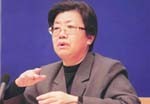 |
State Promotes Science Centers

State Promotes Science Centers
Over the next few years, overseas academic institutions are to be encouraged to set up Sino-foreign joint or solely foreign-owned research agencies in China, a senior science official said Wednesday.
They will also be able to establish international and regional research centers in China to study significant scientific issues that concern the whole world, Minister of Science and Technology Zhu Lilan said at a press conference on international science co-operation, which was hosted by the Information Office of the State Council in Beijing.
China will also set up more research institutions abroad to develop new technologies related to the country's economic and social progress. Foreign countries will be welcome to join this effort, providing research teams and advanced equipment, said Zhu.
She said that these are just a few of China's plans for scientific co-operation with other countries during the 10th Five-Year Plan Period (2001-05).
It is the first time that China has so clearly spelt out an international scientific co-operation scheme in its long-term development plans, sources from the Ministry of Science and Technology said.
Non-governmental firms will enjoy the same policies as State-owned ones when involved in technological co-operation with foreign countries, according to the new scientific co-operation scheme.
Previously, State-owned firms received more benefits than non-governmental ones in international co-operation.
With regard to collaboration programmes projects involving environmental protection, information technology and the human genome project, will take center stage, the scheme stated.
The State will allocate special funds to help implement the scheme, which will kick off early next year, said Zhu.
She didn't give the exact amount of available funds, but said that it will be more than has previously been provided and will be increased, in accordance with the needs of specific projects.
Information technology, including computer software, will continue to be listed as an important development programme over the next few years, said vice-minister Ma Songde.
The ministry will soon define specific co-operative programmes under the scheme, said Wang Shaoqi, director of the ministry's Department for International Co-operation.
To help domestic as well as overseas scientists and institutions apply for these co-operation programmes, the ministry has set up an office specifically to receive applications, said Wang.

In This Section

|